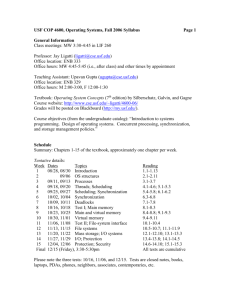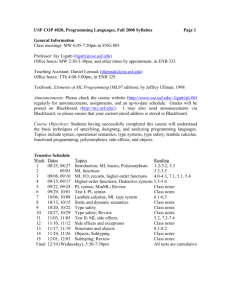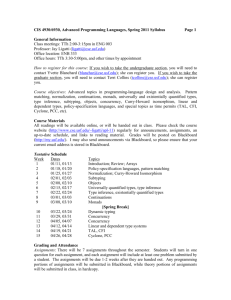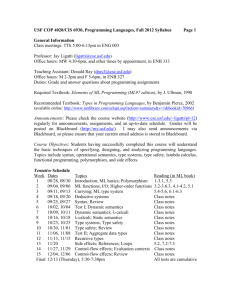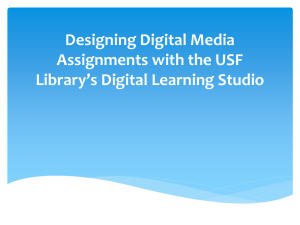Syllabus
advertisement
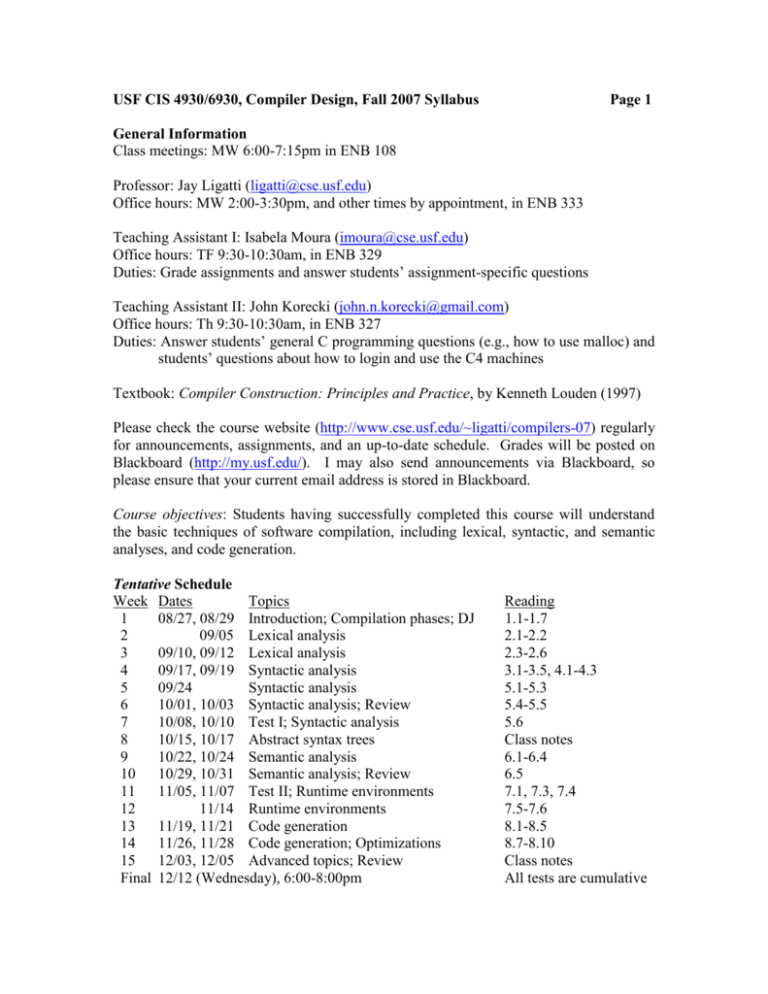
USF CIS 4930/6930, Compiler Design, Fall 2007 Syllabus Page 1 General Information Class meetings: MW 6:00-7:15pm in ENB 108 Professor: Jay Ligatti (ligatti@cse.usf.edu) Office hours: MW 2:00-3:30pm, and other times by appointment, in ENB 333 Teaching Assistant I: Isabela Moura (imoura@cse.usf.edu) Office hours: TF 9:30-10:30am, in ENB 329 Duties: Grade assignments and answer students’ assignment-specific questions Teaching Assistant II: John Korecki (john.n.korecki@gmail.com) Office hours: Th 9:30-10:30am, in ENB 327 Duties: Answer students’ general C programming questions (e.g., how to use malloc) and students’ questions about how to login and use the C4 machines Textbook: Compiler Construction: Principles and Practice, by Kenneth Louden (1997) Please check the course website (http://www.cse.usf.edu/~ligatti/compilers-07) regularly for announcements, assignments, and an up-to-date schedule. Grades will be posted on Blackboard (http://my.usf.edu/). I may also send announcements via Blackboard, so please ensure that your current email address is stored in Blackboard. Course objectives: Students having successfully completed this course will understand the basic techniques of software compilation, including lexical, syntactic, and semantic analyses, and code generation. Tentative Schedule Week Dates Topics 1 08/27, 08/29 Introduction; Compilation phases; DJ 2 09/05 Lexical analysis 3 09/10, 09/12 Lexical analysis 4 09/17, 09/19 Syntactic analysis 5 09/24 Syntactic analysis 6 10/01, 10/03 Syntactic analysis; Review 7 10/08, 10/10 Test I; Syntactic analysis 8 10/15, 10/17 Abstract syntax trees 9 10/22, 10/24 Semantic analysis 10 10/29, 10/31 Semantic analysis; Review 11 11/05, 11/07 Test II; Runtime environments 12 11/14 Runtime environments 13 11/19, 11/21 Code generation 14 11/26, 11/28 Code generation; Optimizations 15 12/03, 12/05 Advanced topics; Review Final 12/12 (Wednesday), 6:00-8:00pm Reading 1.1-1.7 2.1-2.2 2.3-2.6 3.1-3.5, 4.1-4.3 5.1-5.3 5.4-5.5 5.6 Class notes 6.1-6.4 6.5 7.1, 7.3, 7.4 7.5-7.6 8.1-8.5 8.7-8.10 Class notes All tests are cumulative USF CIS 4930/6930, Compiler Design, Fall 2007 Syllabus Page 2 Grading and Attendance Tests: There will be three tests (10/08, 11/05, and 12/12). Tests are closed notes, books, laptops, PDAs, phones, neighbors, associates, contemporaries, etc. Graduate students will be asked to solve additional test problems beyond what is asked of undergraduates. Assignments: There will also be six programming assignments, due at 11:59pm on the following dates: 9/9, 9/23, 10/14, 10/28, 11/18, and 12/7. These assignments will build up a compiler for programs written in a new language called DJ (Diminished Java). Final-grade breakdown: 35% Assignments (4% Assignment I; 5% Assignment II; 6% Assignment III; 6% Assignment IV; 7% Assignment V; 7% Assignment VI) 20% Test I 20% Test II 25% Test III 100% Total Extra credit: Additionally, you may complete independent projects for extra credit. An independent project must be significant and pre-approved. You will have to demonstrate the project for me and turn in a technical description of your work. If you are interested in doing an independent project, please email a proposal to ligatti@cse.usf.edu. Attendance: I do not take attendance in class, but absences put you at risk for missing assignments, schedule updates, and material not covered in the textbook. Students who will miss class for religious reasons must notify me of the date(s) in writing by 08/31/07. Finally, please do not sell notes from or record class lectures without my permission. Late assignments: For each day an assignment is late (up to a maximum of seven days), the grade is reduced 10%. Grading system: For final letter grades, I will use the standard scale of A (100-90), B (8980), C (79-70), D (69-60), and F (59-0). I will also use pluses and minuses on final grades to indicate either a borderline grade (i.e., within 2.5 points of an adjacent grade) or exceptionally outstanding work (A+). Although I may curve test/assignment scores up, with graduate and undergraduate sections curved separately, please do not expect a curve. Academic honesty: Everything you turn in for this class must be your own work. On all work that you submit, I will ask you to write and sign a pledge promising that you have not cheated. If you are caught cheating, you will receive an FF grade for the class. Of course, every part of this syllabus is subject to adjustment as the semester progresses. Please contact me as soon as possible if you are dissatisfied with the course policies, discussions, assignments, grading, etc.; I will be happy to accommodate reasonable requests for modifications.
